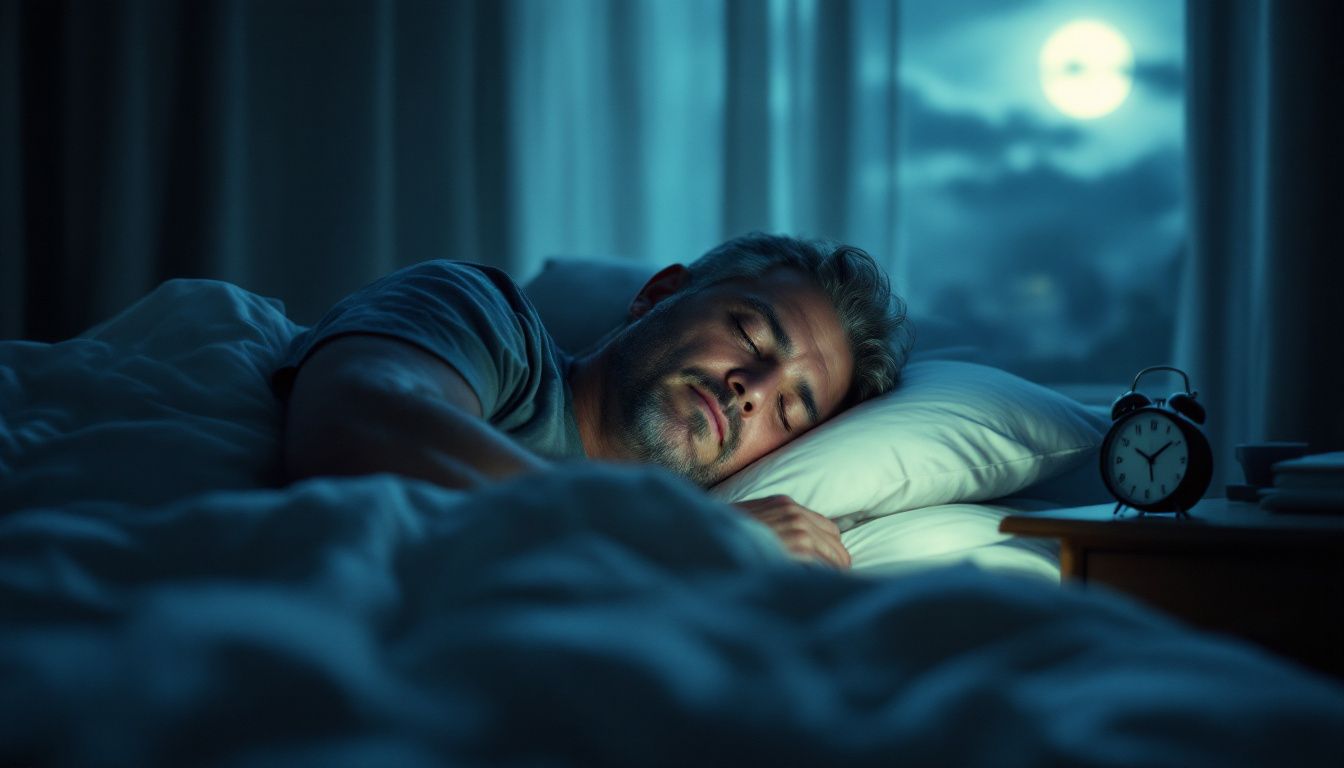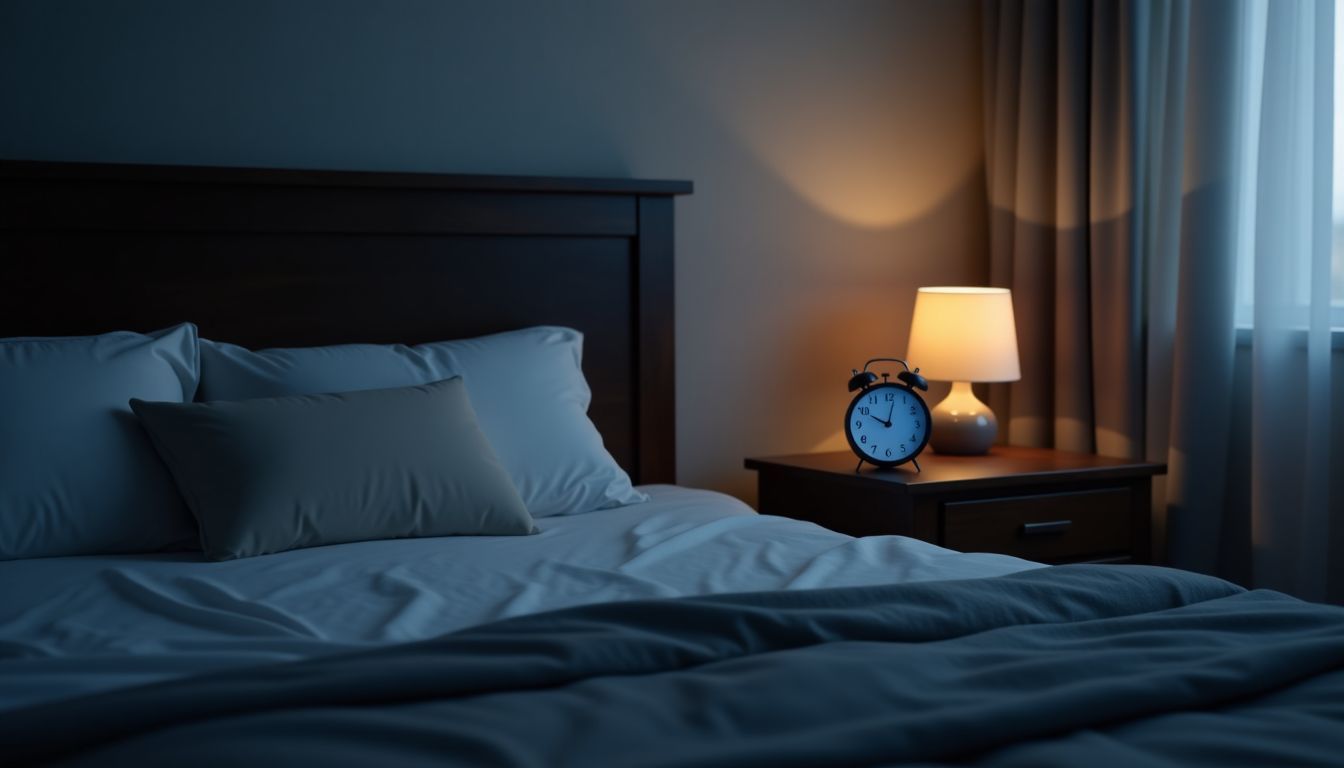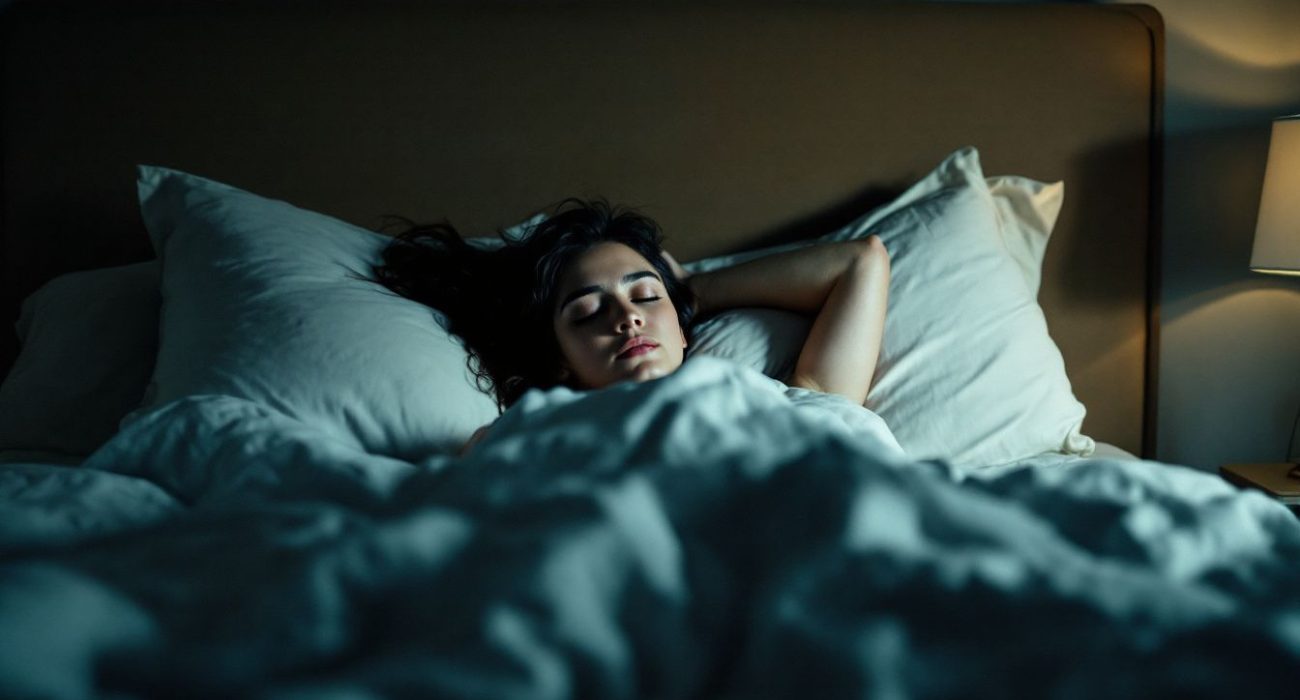Many people find it hard to get a good night’s sleep. Sleep is as crucial as eating and drinking for our health. This article will explain what is sleep and why it matters so much to us.
Keep reading to learn more.
What is Sleep?

Sleep is a natural state where your body and brain are at rest. It helps in repairing, restoring, and promoting overall well-being.
Definition of Sleep
Sleep is a state where the body and mind rest. The brain goes through patterns called sleep stages, which include non-REM and REM (Rapid Eye Movement) sleep. During non-REM sleep, your body heals and grows.
REM sleep helps with learning and memory.
Sleep involves distinct stages, including non-REM and REM sleep.
Characteristics of Sleep
Moving from what sleep is, we explore its features. Sleep has different stages, including non-REM and REM sleep. Each stage plays a role in brain function and physical health. The body moves through these stages to heal itself and make memories strong.
During sleep, the brain stays busy. It goes through cycles that include deep sleep and periods of dream-filled REM sleep. This process helps with learning and emotional health. Good rest keeps the mind sharp and ready for new information.
The Science of Sleep

What happens in your body when you sleep and why it is important. The way our bodies work during sleep and the role of internal processes like circadian rhythms.
Biological Processes During Sleep
During sleep, your body goes through many changes. Your brain waves slow down, and your heart rate and blood pressure drop. This is part of the non-REM sleep stages. In this time, growth hormones are released to repair cells and help you grow.
Also, your body temperature falls by 1–2°F.
Sleep is when your body heals itself.
After these restorative processes, your sleep moves into the REM stage. Here, brain activity picks up again almost like when you’re awake. This part plays a key role in learning and memory consolidation.
Let’s move on to talk about how circadian rhythms guide this whole cycle.
The Role of Circadian Rhythms
Circadian rhythms are our body’s internal clock that tells us when to sleep and wake up. They run on a 24-hour cycle. This cycle is affected by light and darkness. Light makes retinal cells in our eyes send signals about day or night to our brain.
This helps keep our sleep-wake cycle in line.
Our internal clock also plays a big role in making us feel sleepy or alert at certain times. It works closely with the sun’s patterns. So, changes in daylight can mess with our sleep schedule.
For example, jet lag happens because flying across time zones changes the light we see. This confuses our circadian rhythms.
Stages of Sleep

The stages of sleep involve distinct phases with specific brain activities and physiological changes. These include non-REM sleep, with its own set of substages, and REM sleep where dreaming occurs.
Non-REM Sleep
Non-REM sleep has stages. The first stage is a light nap that lasts just a few minutes, making up 5% of our whole rest time. It’s when we start to fall asleep but can still wake up easily.
We enter the third stage after going through the second one, which isn’t mentioned here. This third stage is when we are in deep slumber, and it lasts between 20–40 minutes, taking up about 25% of our sleeping cycle.
During this phase, our body repairs itself and builds energy for the next day.
Sleep is where real magic happens for our health.
Now let’s look into REM sleep, where dreams occur and memory gets stronger.
REM Sleep
REM sleep, or rapid eye movement sleep, begins about 90 minutes after you fall asleep. It can last from 10 to 60 minutes. During this stage, your eyes move quickly in different directions.
This does not happen during non-REM sleep stages. Dreams mostly happen during REM sleep.
You dream for around two hours each night, often during REM cycles. This stage makes up about one-fourth of your total sleep time. Your brain is very active in REM sleep, almost like when you are awake.
This part of sleeping helps with learning and memory consolidation.
Why Do People Sleep?
People sleep to restore their physical and cognitive functions. The brain consolidates memories and allows the body to repair itself during sleep.
Physical Restoration
Sleep is key for physical restoration. It helps our bodies repair and grow. This happens because growth hormone gets released during sleep. Our organs slow down, too. For example, our kidneys work less and we make less urine.
This rest time is vital for health. Without it, our immune system weakens. Sleep loss can lead to many problems, like more sickness and slower healing. So, getting enough deep sleep each night helps us stay strong and healthy.
Cognitive Function and Memory Consolidation
The significance of optimal sleep is tied closely to the functionality of our brain. It contributes to the creation and maintenance of neural pathways that aid in learning and creating fresh memories.
A lack of sufficient sleep can hinder our capacity to absorb and retain knowledge.
In the course of the night, our brain undergoes phases of profound sleep (NREM) and REM sleep. This sequence plays a pivotal role in solidifying memories, allowing our brain to process daily learnings and store them effectively.
Hence, ensuring good sleep every night is vital for strong memory retention.
How Much Sleep Do You Need?
How much sleep do you need? Determining the right amount of sleep for each age group. The impact of sleep duration on health and well-being.
Sleep Recommendations by Age
Getting enough sleep is key for staying healthy. People need different amounts of sleep at different ages. Here’s a table showing how much sleep is recommended:
| Age Group | Sleep Duration |
|---|---|
| Newborns (0–3 months) | 14–17 hours |
| Infants (4–11 months) | 12–15 hours |
| Toddlers (1–2 years) | 11–14 hours |
| Preschoolers (3–5 years) | 10–13 hours |
| School-age Children (6–13 years) | 9–11 hours |
| Teenagers (14–17 years) | 8–10 hours |
| Young Adults (18–25 years) | 7–9 hours |
| Adults (26–64 years) | 7–9 hours |
| Older Adults (65+ years) | 7–8 hours |
Kids need a lot of sleep as they grow. Adults need less but still require 7 to 9 hours. This table helps you see how much sleep you or your family members need. Sleep keeps you healthy, helps you think clearly, and feel good. Try to get the right amount each night.
The Impact of Sleep Duration on Health
Insufficient sleep significantly impacts physical health by raising the chances of developing high blood pressure, cardiovascular diseases, and diabetes. Moreover, chronic sleep deprivation is connected with cognitive decline and an elevated risk of dementia in the future.
Sleep Disorders
Sleep disorders can significantly impact a person’s quality of life. Common sleep disorders include insomnia and sleep apnea, which can lead to serious health issues if left untreated.
Common Sleep Disorders (e.g., Sleep Apnea, Insomnia)
Sleep apnea, a sleep disorder marked by intermittent breathing cessation, impacts more than 25 million Americans.
This condition may result in severe health issues, such as elevated blood pressure, heart disease, and stroke, while also affecting individuals’ daily activities.
Insomnia, another prevalent sleep disorder linked to challenges in falling or staying asleep, affects roughly 30% of adults at some stage in their lives.
Persistent insomnia can contribute to additional health problems, including depression, anxiety, and diminished cognitive abilities.
Moreover, it can negatively influence work productivity, accidents, and an overall diminished quality of life.
Symptoms and Diagnosis of Sleep Disorders
Sleep disorders can come with various symptoms that can affect an individual’s daily life. Here are some common symptoms and methods for diagnosing sleep disorders:
- Symptoms of Sleep Disorders:
- Difficulty falling asleep
- Trouble staying asleep
- Excessive daytime sleepiness
- Loud snoring
- Gasping for air during sleep
- Restless legs during sleep
- Feeling irritable or anxious
- Diagnosis of Sleep Disorders:
- Physical examination by a healthcare provider
- Keeping a sleep diary to track patterns and behaviors
- Formal assessment through a polysomnography (sleep study)
- Monitoring devices at home to measure breathing, oxygen levels, and heart rate during sleep
Effects of Sleep Deprivation
Sleep deprivation can lead to physical health consequences like weakened immune system and increased risk of chronic conditions. It also has a significant mental and emotional impact, contributing to mood disturbances, cognitive impairment, and decreased ability to cope with stress.
Physical Health Consequences
Chronic sleep deprivation can result in high blood pressure and an increased risk of cardiovascular disease. Long-term lack of sleep may lead to cognitive decline and even dementia, emphasizing the need to prioritize getting enough rest each night.
These outcomes highlight the significance of maintaining healthy sleep patterns for overall physical well-being.
Mental and Emotional Impact
Lack of sleep affects your mood and weakens your immune system, making you susceptible to illnesses. Not getting enough sleep can lead to hallucinations and impulsive behavior. It’s important to prioritize good sleeping habits for better mental and emotional well-being.
Sleep deprivation causes changes in mood and lowers immunity. This makes it easier for sicknesses to affect a person’s health. The lack of rest can make someone see or hear things that are not real and act impulsively.
Therefore, it is crucial to focus on developing healthy sleeping patterns for improved mental and emotional health.
Improving Sleep Quality
To improve sleep quality, aim for a consistent sleep schedule, including weekends. Ensure your bedroom is comfortable and dark, and avoid screens right before bed to promote better sleep.
Tips for Better Sleep Hygiene
- Keep a consistent sleep schedule, including on weekends.
- Create a comfortable and dark sleeping environment. Use earplugs or a white noise machine if needed.
- Limit exposure to screens and artificial light before bedtime, as they can disrupt sleep patterns.
- Avoid heavy meals, caffeine, and alcohol close to bedtime.
- Establish a relaxing pre-sleep routine such as reading or taking a warm bath.
The Role of Sleep Environments
Creating an ideal bedroom environment is crucial for quality sleep. The room should be dark, cool, and quiet to promote restfulness. Using comfortable bedding and mattresses can also contribute to better sleep quality.
Moving on to “Treatments for Sleep Problems”…
Treatments for Sleep Problems
– Behavioral Therapies
– Medications and Alternatives
Behavioral Therapies
Behavioral therapies, such as cognitive-behavioral therapy (CBT), are effectively used to treat insomnia. These therapies integrate sleep hygiene education, which is critical in addressing sleep problems.
CBT has been shown to help individuals suffering from insomnia to improve their sleep quality and overcome difficulties in falling asleep and staying asleep. This form of therapy focuses on modifying behaviors and thoughts that may be hindering restful sleep, making it an impactful treatment for those struggling with sleep disorders.
Furthermore, behavioral therapies play a crucial role in improving overall well-being by helping individuals establish healthy habits conducive to better sleep. Through these therapies, individuals learn valuable strategies to enhance their nightly routines and create optimal environments for quality rest.
As a result of the effectiveness of behavioral therapies, they have become an essential component in addressing various sleeping issues, providing tangible solutions for those seeking improved sleep patterns.
Sleep Medications and Alternatives
- Prescription medications for sleep disorders include Z-drugs and benzodiazepines. Z-drugs are nonbenzodiazepines used to treat insomnia, while benzodiazepines have sedating effects and may be prescribed for short-term use.
- Over-the-counter options for sleep aid include antihistamines and melatonin. Antihistamines, such as diphenhydramine, can induce drowsiness, and melatonin is a hormone that regulates the sleep-wake cycle and can be used to alleviate jet lag or shift work disorder.
These medications and alternatives aim to address various sleep-related issues, providing relief from insomnia or other sleep disorders through different mechanisms of action.
Conclusion
Understanding the science and importance of sleep highlights its critical role in overall health. Sleep improves brain function, consolidates memory, and supports physical restoration.
Without sufficient sleep, the likelihood of chronic diseases rises. Establishing a sleep-conducive environment and adhering to good sleep habits are essential for quality rest. It’s evident that emphasizing healthy sleep patterns greatly benefits both body and mind.

